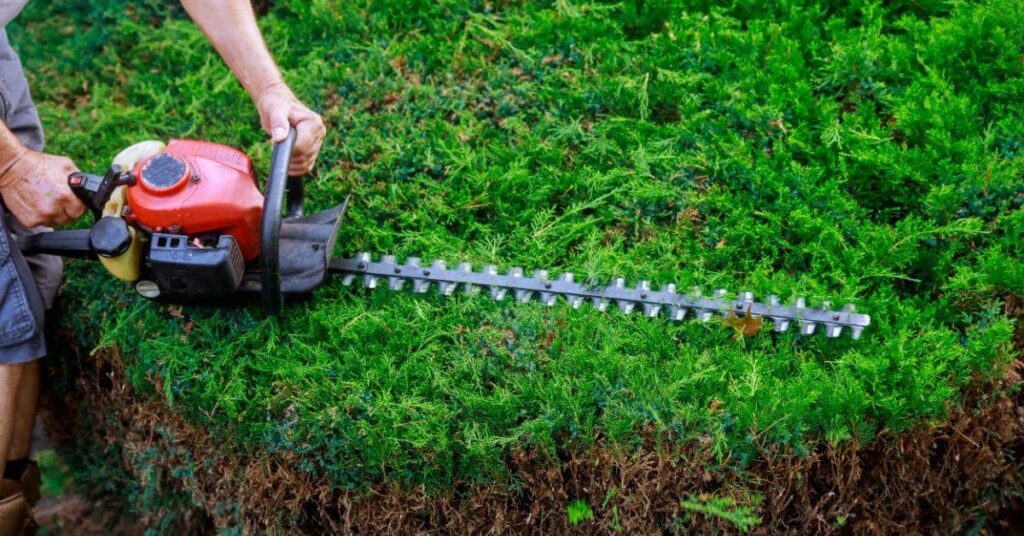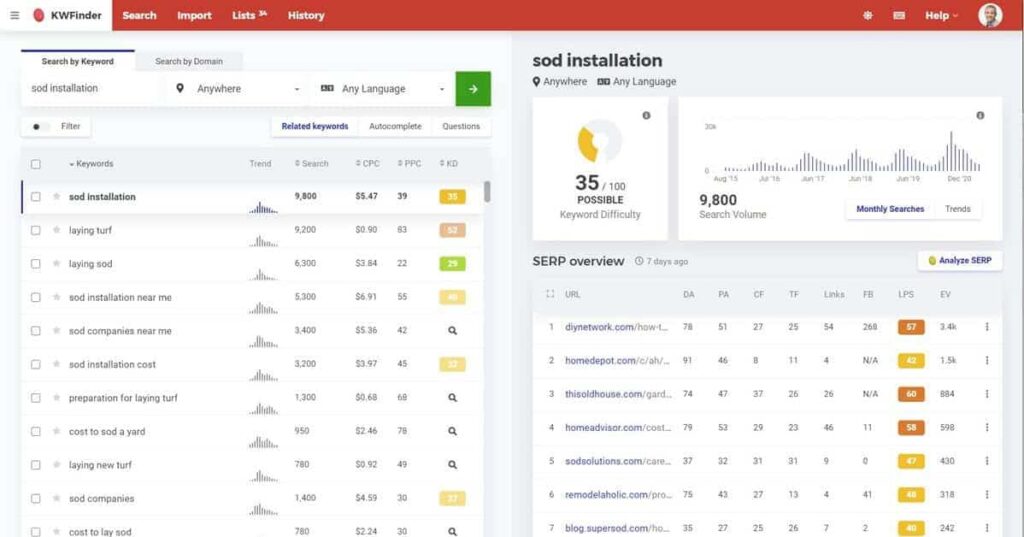Getting Started on a Shoestring Budget
One of the biggest misconceptions about how to start a landscaping business with no money is believing that money is necessary to get the business off the ground.
Sure, some investment will be necessary. Throwing in too much money at the start is a great way to kill the business before enjoying any success.
Between buying a lawn mower and knocking on doors versus spending hundreds or thousands of dollars on equipment and advertising, buying a lawn mower is the better option.
With the minimalist seed planted, keep reading to see some viable options that do not carry dire consequences for failure.
Make a Plan
When starting a landscaping company, a plan is necessary, even if the business structure means calling friends to see if anybody needs landscaping or knows someone who does. Do not laugh; knocking on doors and calling people is a viable startup business plan for landscaping.
A friend may not need any work done, but that person might live in a neighborhood full of middle-aged potential clients who do. Some people hesitate to call friends and family about business matters, but a little word of mouth can go a long way and is not a burden. Do not let shyness waste this opportunity.
Make a list of everything that can help with landscaping, including savings and equipment already in inventory. For example, already owning a landscaping truck, a lawnmower, a shovel, and a hedge trimmer goes on the list.
On the first job that requires purchasing new tools, give a quote and ask for a downpayment that covers the cost of the needed equipment. Most people will not agree to a downpayment that covers a new riding lawn mower, but a new string trimmer or edger may be within reach.
Focus on offering reasonable services based on known skills. Anybody can mow a lawn or trim around trees and hedges. Not everybody can construct a garden or create a yard full of beautiful grass that does not yet exist.
Everybody will feel a temptation to agree to do work that is beyond their skillset to save face and hope to get paid. The gamble might work out, but the odds are not good. The best advice is to decline difficult jobs and learn new skills later.
Not many people know how to reseed a lawn properly, but a million videos show how for free. After researching landscaping techniques, a small business owner can agree to take on work with newly acquired skills and get started writing bids for landscaping jobs.

It is Challenging but not Impossible to Start a Landscaping Business if You’re Low on Funds
Decide on Essential Tools
Make a list of the tools the business needs and only buy the necessities. Most new landscaping businesses will have a push mower, a line trimmer, and maybe an edge trimmer. A good-quality line trimmer can do the job of all three tools until the business gets off the ground.
Base essential tool purchases off of two factors: special and general skills. A landscaper with a new company who knows how to tend a garden might decide to purchase extra tools on top of a lawn mower. 
A Push or Riding Lawn Mower Is Essential for Lawn Care. Purchase or Rent Equipment Depending on Your Finances
If no special skills exist, create a list of new skills to learn and research equipment prices. This to-do list might make a great candidate to put on the refrigerator door. Do a little extra research at night and gradually strike tasks off the list.
Why Consider Insurance?
Landscaping Business Insurance is one place where spending money early might be necessary. Whether or not to get insurance from the start is a difficult personal decision for someone with limited funds.
General liability insurance is a good place to start. The reason to have insurance could be something as simple as a rock flying out of the lawnmower and damaging something. Injuries can happen on the job, especially with landscaping. Somebody might sue the business, and insurance offers protection from libel and slander.
Most tools have built-in safety mechanisms, such as some form of guard. The tool is probably unsafe to use without the safety mechanism. Business insurance is the safety mechanism for a landscaping startup.
How to Get Extra Money
A small business loan, while not advisable if avoidable, might be the only way to acquire working capital or manage equipment financing for a small business owner.
One thing many people forget is that private loans are an option on top of credit or bank loans. Private loans allow the lender and borrower to set up any terms on which the two parties agree.
With credit or bank loans, the terms are typically not negotiable and repossession can quickly follow missed payments. The conditions for private loans between family and friends are rarely so harsh.
With a solid business plan, finding an investor or raising funds are also possibilities to look into. With an investor, be sure to carefully plan how much of the profits the investor receives versus pricing and costs. Not much good can come from paying an investor and not having enough money left over for gasoline.
Less Is More
With a new business, the last thing anyone needs is to be spending plenty of cash on everything – especially if you don’t have a steady stream of incoming jobs. Learning to be frugal is much more beneficial. The best time to learn valuable lessons is in the beginning. Making wise spending decisions does not go away once a company starts making money.
Carefully choosing where and how to spend from the start teaches a skill that will be necessary to maintain during the life of the landscaping business.
What if the economy takes a nosedive, and more people start taking care of their lawns to save money? There could be a short summer or a long winter that eats into landscaping profits. Knowing how to tighten the belt and maintain good spending habits will help weather potential storms looming on the horizon.
Being frugal will help to teach a new landscaper the essential skills necessary for day-to-day business. The company can grow in a controlled way by building up gradually, slowly adding equipment, and learning new skills.
What Are the Benefits of Landscaping as a Side Hustle?
A secure day job that pays the bills, even a hated one, is a valuable thing. Not leaving a job to pursue a dream is one of the best arguments for the benefits of a side hustle.
For worthwhile part-time landscaping, the best strategy is to start with weekend jobs, for example, for the best profit margins possible. If the client is a friend, taking on a job that takes more than one weekend might be okay, but new clients might not be happy.
For landscaping as a side hustle, take on jobs at a fixed rate. When starting, doing a good job at a pace that is too slow for hourly rates is not a problem. A disappointed client who does not like the results is far worse. The reputation the company gets early could stick, so take a fixed rate and work hard for as long as necessary to get a good result.
Calculating Profit Margins
One thing to be ready for is that a client might ask for a landscaping service that requires a new skill. Acquiring a new skill probably is not difficult but may require a learning curve nonetheless. The new skill could turn out to be very profitable.
The next scenario is calculating a well-known skill like cutting grass. One thing a lot of people forget to do is account for wear and tear on equipment. Every revolution of the blade when a lawn mower is cutting grass leads to a future cost in maintenance.
For the same reason, most people do not realize that renting is not much more expensive than buying in the long run. Renters should get a product that works, and they do not have to pay for repairs if something breaks.
Landscapers are, in effect, renting themselves and their tools out. For this reason, landscapers cannot think in terms of dollars per hour like a salary. A lawn mower part might not break for years, but in that time the mower needs to pay for fuel, pay the landscaper, and pay for itself in maintenance or replacement costs.
How to Calculate a Job
Here is a simplified scenario: let’s say that cutting a large lawn takes two hours. The price is $100. As the solo landscaper, you’re working alone in this example. So you get to pocket the entire $100, right? That’s $50/hour – pretty good, right?
Not exactly.
Unfortunately, all that cash won’t make its way directly into your bank account.
In reality, you’re making more like $ per hour.
Your operating costs will eat into the revenue provided to you by the customer.
Here are just some sample costs that are needed for you to complete this $100 landscaping job:
$3 Fuel Costs
You need gas for your in gas for your mower, trimmer, and the truck that actually takes you and your equipment to the customer
$3 in Equipment Costs
With each landscaping job, your vehicle and equipment suffer depreciation and maintenance costs. If you’re renting your equipment, you’ll also incur a cost
$15 Marketing and Advertising,
Unfortunately, customers don’t just appear out of thin air. While you knock on doors or rely on friends and family early on, as you grow you’ll have to hire a marketing agency, an employee, or pay for a leads service to bring those leads to your business
$2 Business Insurance Costs
You’ll want to make sure that you’re covered in case of an accident while working on a landscaping job.
$5 Health Insurance Costs
Landscaping jobs involve working with heavy, sharp equipment. Burns, Cuts, and strains can be a common occurrence. You’ll want to make sure that you have good health insurance to avoid hefty hospital bills.
These overhead costs add up to $28 of that $100 just to run your businsess. Your effective rate per hour goes from $50/hr down to $36/hr ($100-$28 = $72). Divide this $72 by 2 and you’ll end up at $36/hr.
Time between jobs is also a factor when pricing landscaping jobs. Let’s say that for every two hours you’re working that you’re driving one hour. This means that your hourly rate is cut even further.
$35/hr *⅔ productive time = $24/hr
As a result, you’ll want to build in enough margin into your bids to ensure that you get the hourly rate that you desire.
Choose a Marketable Name
Whether from the start or as an eventual investment, all landscaping businesses rely on marketing. The name and logo will be the front and center of every type of marketing, from a business card to ads and commercials.
The name might be Bob’s Lawn Care Services. If so, guess who people expect to meet? They expect to meet Bob. There might be a couple more employees, but the boss must be Bob. Whatever the name is, what the customer receives should be consistent.
There might be a temptation to pick a clever name or one that makes an inside joke. Even though such a name might seem humorous, potential clients might not get the reference. Simple and direct names work best – nothing complicated with too many words.
Using your location and the type of landscaping services you provide is an effective way to communicate to prospects exactly what your company offers.
Another thing to think about in the modern internet era is that even if there are no plans to go online now, a website is a likely investment for the future if business is good. Even Facebook pages need unique names.
A unique name is a requirement for securing a URL. Make a list of names and search for URLs that already exist. Here is a simple example of what might happen.
Perfect 10 Landscaping LLC already exists. However, for a person in the state of Tennessee, Tenn is a common contraction for the name of the state. Perfect Tenn Landscaping does not exist. Registering the domain name should not be too difficult, even if a website is years away.
After established growth in the future, the unique name can help attract SEO traffic to rank higher in searches for local landscapers. While the planning for going online might need to wait a few years, jumping on an available domain name should happen immediately.
Register Your Business
There are different types of businesses you can register, but an LLC is a great option. A teenager who buys a shovel and starts knocking on doors, per the advice above, might not need a business license. If things get any more serious, shielding yourself from liability is a good idea.
The reason starting an LLC offers protection is that the person who registers the company is a member. If the LLC becomes liable for some kind of damage, the member’s name has limited liability. If a liability issue leads to a court case, the LLC name gets sued, not the member who created the company.
The advantage is in the title. LLC means Limited Liability Company. Having the LLC take on liability can also be beneficial with loans and credit issues. Defaulting on payments is stressful enough. Shifting liability to a company eases some of the burdens.
Deciding on whether or not to become an LLC should be part of any sensible checklist. The Small Business Administration is a great resource. Have a list and check off the most important items before taking on the risk of having to accept personal liability.
Why Landscaping Businesses Fail
In any market, there are factors nobody can control, such as a bad economy. If money is tight in a recession, everybody suffers, including landscapers.
Apart from unavoidable circumstances, most businesses fail because of poor management. Poor management takes many forms. The product provided might be of low quality. The owner or manager of the sole proprietorship might mismanage money. Customer service may be poor and result in a bad reputation, and former clients who never call again.
One of the hardest skills to master in running a business is getting everything right. As crazy as that sounds, everything has to be right. The landscaping has to look great. The client has to think the price is fair and feel well-treated.
The little things matter too. Some clients will already be in a bad mood when a landscaper shows up an hour later than the agreed-upon time. One fact of life landscapers have to realize is that clients need their services, but other landscapers can do the work just as well.
The same is true for plumbers and electricians, to a degree. The difference is that when most people need a plumber, only a qualified plumber can do the work. A competent plumber will have loyal customers.
The landscaping industry is full of people who can replace each other, especially with skills like cutting grass and trimming. Every landscaper needs to focus on doing good work, providing good customer service, and making smart business decisions.
What Is a Landscaping License?
A license is a hidden cost many people do not see coming. Depending on the state, landscaping may require a license. There also might be at least one exam. The good news is, people can usually show up and mow the lawn and start trimming edges without a hassle in many states.
All states regulate spraying pesticides in some way. States with a lot of freedoms, like Florida Missouri, and Texas do not require landscaping licenses.
A landscaper may be able to stick to mowing lawns without a license, but cannot get into seeding, laying grass, planting, or tree surgery if unlicensed. Some local areas require licensing, regardless of state law.
Showing proof of insurance is not uncommon, so check state requirements during initial planning phases.





